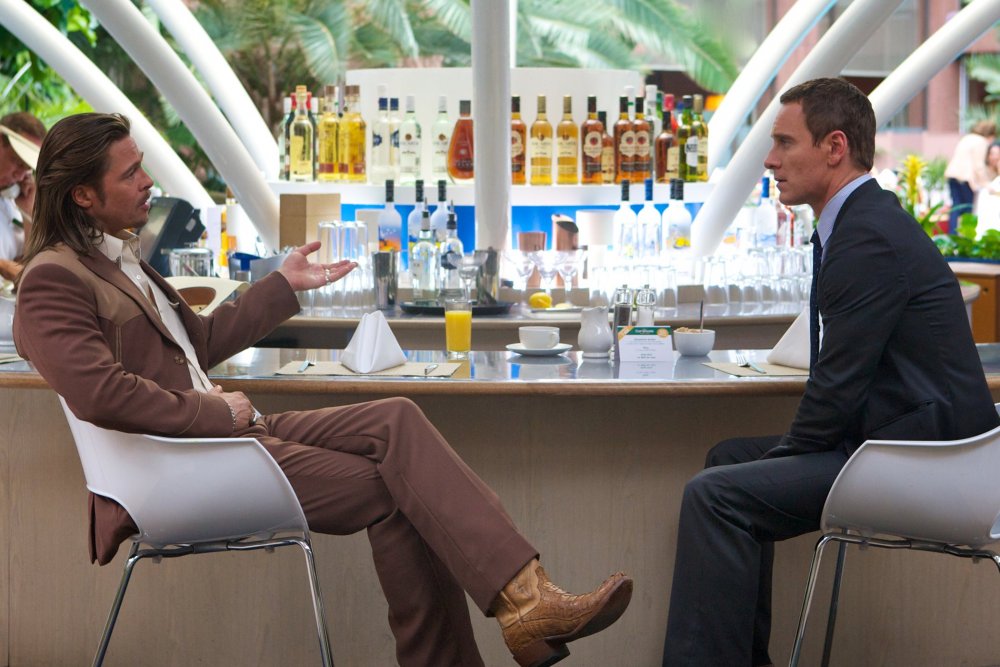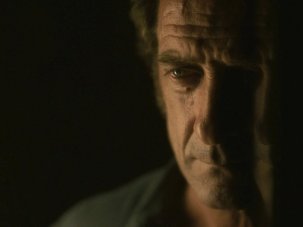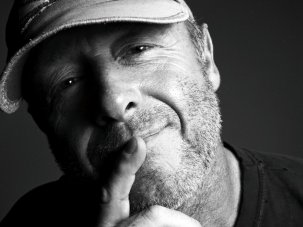Spoiler alert: this review reveals several major plot twists.
As Chekhov famously remarked, “If in the first act you have hung a pistol on the wall, then in the following one it should be fired. Otherwise don’t put it there.” Ridley Scott and his screenwriter Cormac McCarthy follow Chekhov’s dictum to the letter.
|
USA/United Kingdom 2013 Crew Cast Dolby Digital/Datasat Distributor 20th Century Fox International |
Early on in The Counsellor, flamboyant bon viveur Reiner (Javier Bardem) describes to his El Paso lawyer friend the Counsellor (Michael Fassbender) an ingenious mechanised garrotting device called a bolito. It’s slipped over the victim’s head, and a small electric motor at the side steadily tightens a wire around the throat until the carotid artery is severed. It can’t be removed or stopped – death is inevitable.
And in the last few minutes of the film we see just such a device used on drug-dealing middleman Westray (Brad Pitt) in the incongruous surroundings of a daytime street in the City of London. Westray desperately tries to impede the bolito by slipping his fingers under it, and as he collapses on the pavement with blood spurting from his throat we’re granted – just to enhance the effect of the scene – a close-up of his outflung hand, the fingers sliced off.
Likewise, at an earlier juncture Westray, trying to impress on the Counsellor the kind of people he’s getting involved with, gives him a graphic account of a snuff movie one cartel made for a rich client in which a teenage girl was decapitated before the client fucked the headless corpse. “The point is, Counsellor,” he adds, “you may think there are things that these people would simply be incapable of. There are not.”
So when at the end of the movie the Counsellor, holed up in a Ciudad Juárez flophouse, receives a video disc with ‘Hola!’ scrawled on it, he collapses on the floor weeping in anguish. He has no need to view the disc to know what it shows – and, since we’ve seen the headless body of his beloved fiancée Laura (Penélope Cruz) dumped out on to a garbage tip, neither have we.
Westray’s remarks aren’t the only time the Counsellor is warned that he’s moving into territory more dangerous than he could imagine, and that he’s totally unsuited to dealing with. “If you pursue this road that you’ve embarked upon,” Reiner predicts when he first proposes their deal, “you’ll eventually come to moral decisions that will take you completely by surprise – ones you didn’t see coming at all.”
Despite which he persists, precipitating along with his own ruin the violent death of most of his associates and of the woman he loves. As a Mexican police chief whose help he seeks tells him, “You continue to deny the reality of the world you’re in.” His job title – we never learn the character’s name – is highly ironic: not only does he rarely seem to counsel anybody, but this is a man who seems quite incapable of taking advice on his own account.
Right from the outset, we come to realise, the Counsellor has unknowingly crossed a border between the comfortable world he’s accustomed to and one in which no rules apply – or none that he can comprehend. Worse, it’s a border that can only be crossed in one direction; there’s no going back. “The world in which you seek to undo your mistakes,” the jefe explains, “is not the world in which they were made. You are at a crossroads and here you think to choose. But here there is no choosing. There is only accepting. The choosing was done a long time ago.”
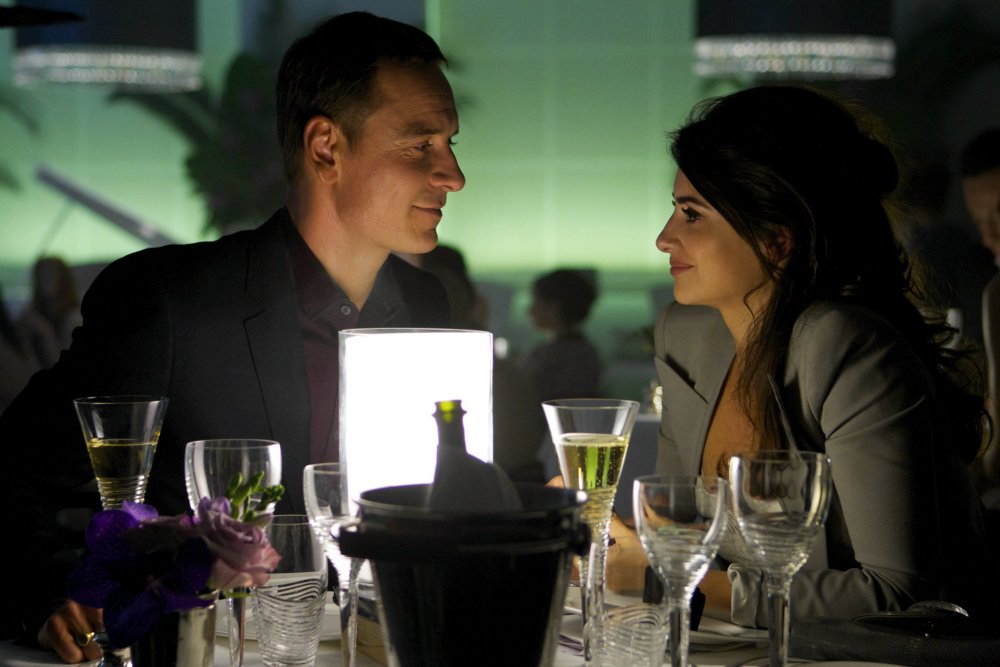
The Councellor (2013)
The concept of a border between the relatively civilised, ordered world in which most of us think we live, and a world in which there are no rules and the most unspeakable things will be done simply because they can be done, is central to the work of McCarthy, whose first original film script this is. The three novels – All the Pretty Horses, The Crossing and Cities of the Plain – that brought him to international fame have been grouped together as ‘The Border Trilogy’ and in all of them (as in his earlier Blood Meridian) the US-Mexican border stands as a metaphor for this key dichotomy. In Mexico (or at least in McCarthy’s vision of it) the dreams and aspirations that maybe seemed harmless enough a few dozen miles to the north must be paid for in blood, pain and death. (The vision isn’t so far from the truth, as we’re reminded when the Counsellor stumbles on a street demonstration demanding justice for the hundreds of young women murdered or disappeared in Chihuahua State in recent years.)
Given this blacker-than-hell world of perpetual treachery and limitless violence, it scarcely matters that for most of the film it’s hard to tell just who’s double-, triple- or quadruple-crossing whom and why. All that counts is the result: that the consignment of drugs that sets out from Ciudad Juárez concealed in a septic-tank truck, having been hijacked two or three times en route, duly arrives at its destination in Chicago; that by then several of those involved are dead, or soon will be; that the Counsellor has lost everything except – as yet – his life; and that one person, Reiner’s erstwhile girlfriend Malkina, has gained everything.
Malkina (Cameron Diaz), svelte and feline, her smile like a sliver of ice, first appears lounging in a folding chair on the Texan prairie at sunset, watching two cheetahs hunt jack-rabbits while Reiner mixes her a martini. Her identification with the predators is absolute; later, as she indulges in poolside girly chat with Laura, we see that she has a cheetah-print tattoo extending from her shoulder to the back of her thigh. And in the film’s final scene, lunching with her banker Michael (Goran Visnjic) in London, having engineered the death of her lover, of Laura and of several others, she names as her sole regret the loss of the two big cats. “To see a quarry killed with elegance,” she observes, “it’s moving to me.”
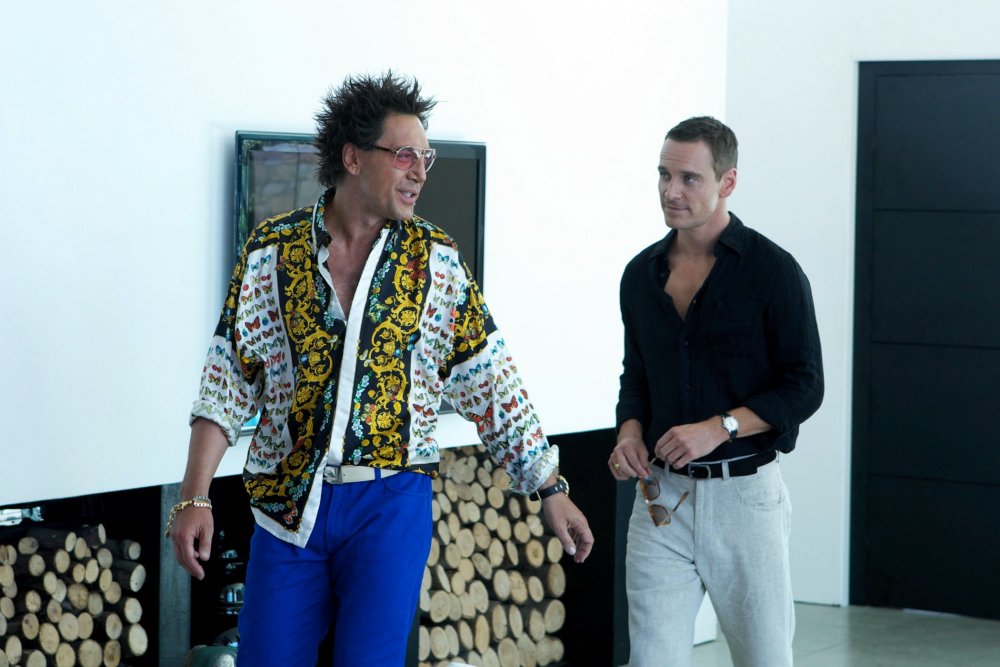
The Councellor (2013)
In the title role, Fassbender channels a hint of the solipsism of his sex-addict in Shame into his portrayal of a man rather too enamoured of his own glitzy lifestyle and not as smart as he thinks he is. (“They know that you’re stupid,” Westray comments, referring again to the faceless cartels. “They just don’t know how stupid.”)
He’s backed by a 24-carat cast that includes, along with Bardem (sporting another notably eccentric hairstyle after No Country for Old Men, this time with his dark locks coruscating about his head as if he’s been electrocuted), Diaz, Pitt and Cruz, a rich roster of cameos: Visnjic, Bruno Ganz as a philosophical Amsterdam diamond merchant, Rosie Perez as a jailbird who’s seemingly the Counsellor’s only client and Rubén Blades as the fatalistic police chief.
Given how completely it exemplifies McCarthy’s sardonic, pessimistic and mercilessly retributive world-view (worth recalling that he was raised Catholic), it’s tempting to treat The Counsellor largely as his film. But he’s teamed up with Ridley Scott, a protean director who can switch seamlessly from the explicit sensual heat of the opening bedroom scene between Laura and the Counsellor, to the virtuoso machine-gun editing of a scene where a motorcyclist is decapitated at 200 mph on a desert road, to the Counsellor’s inexorable descent into the City of Dreadful Night that is Juárez, its dark tawdry streets often recalling Blade Runner. Between them, Scott and McCarthy have created a film that in less accomplished hands could have slumped into melodrama, but that retains the grim humour, and the granitic implacability, of a classic morality tale.
-
Sight & Sound: the December 2013 issue

In our December issue: lost in space with Gravity, in time with Computer Chess, at sea with Leviathan and in love with Blue is the Warmest Colour.
-
The Digital Edition and Archive quick link
Log in here to your digital edition and archive subscription, take a look at the packages on offer and buy a subscription.




